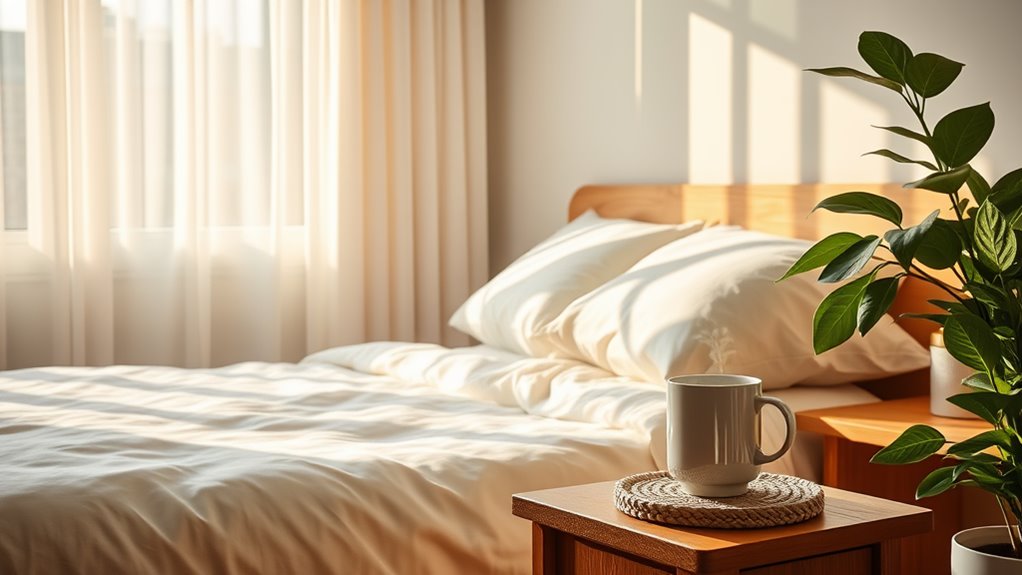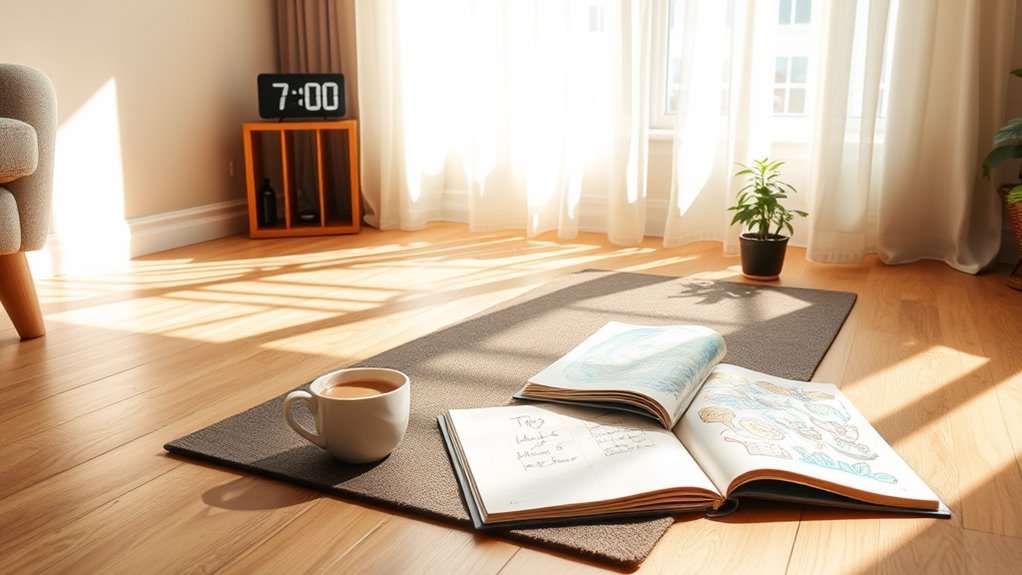How I Transformed My Sleep Quality With One Simple Change
One simple change you can make to transform your sleep quality is establishing a consistent bedtime routine. By going to bed and waking up at the same time every day, you help regulate your internal clock. This routine signals your body when it’s time to wind down, reducing stress and promoting relaxation. Couple this with pre-bed activities like gentle yoga or reading, and you’ll notice a significant improvement in your sleep. Discover other effective strategies to enhance your rest even further.
Key Takeaways
- I established a consistent bedtime routine, helping regulate my internal clock and signaling my body it’s time to wind down.
- I turned off screens an hour before bed, allowing my melatonin levels to rise and reducing insomnia risk.
- I created a calming pre-sleep ritual, incorporating activities like reading and deep breathing to promote relaxation.
- I optimized my sleep environment by adjusting the temperature and eliminating light and noise distractions.
- I began tracking my sleep patterns to identify issues and make adjustments for better rest quality.
Identifying the Sleep Disruptors
When you’re struggling to get a good night’s sleep, it’s crucial to identify the disruptors affecting your rest.
Medical sleep disorders, like insomnia and sleep apnea, could be sabotaging your nights. Insomnia impacts one-third of adults, while sleep apnea affects at least 18 million in the U.S. Physical factors such as snoring and obesity also play significant roles in sleep quality. Obstructive sleep apnoea (OSA) can lead to disrupted sleep and excessive daytime tiredness, further complicating your ability to rest well. Prioritizing the importance of sleep is essential for improving overall well-being.
Additionally, lifestyle elements, including stress, caffeine intake, and screen time before bed, can hinder better sleep.
Don’t overlook psychological factors; mental health conditions and emotional triggers can exacerbate these issues.
Embracing a Consistent Bedtime Routine
Establishing a consistent bedtime routine can profoundly impact your sleep quality. By incorporating calming pre-bed activities and preparing your sleep environment, you set the stage for restorative rest. Embracing this routine not only enhances your sleep but also supports your overall well-being. Research indicates that consistent routines can lead to improved sleep quality and duration, making them essential for fostering a healthy sleep environment. Engaging in calming activities during your nighttime routine can significantly help in winding down and preparing your mind for sleep.
Importance of Routine
A consistent bedtime routine can considerably enhance your sleep quality, making it easier to fall asleep and wake up refreshed. By adhering to a regular schedule, you help regulate your body’s internal clock, which is essential for ideal sleep. Establishing bedtime routines simplifies adherence to sleep practices, ultimately contributing to better sleep outcomes. Research shows that the more consistently you follow a routine, the better your sleep outcomes will be, effectively reducing disturbances and sleep issues. This isn’t just for children; adults benefit as well, with over half reporting improved sleep quality through regularity. Additionally, a well-structured routine can transform your sleep by promoting relaxation and signaling to your body that it’s time to wind down. Implementing a routine may take some effort initially, but within weeks, you’ll likely notice significant improvements in your sleep metrics, leading to enhanced overall well-being. Embrace this simple yet powerful change for a transformative sleep experience.
Pre-Bed Activities
To truly embrace a consistent bedtime routine, you’ll want to incorporate calming pre-bed activities that signal to your body it’s time to wind down.
Start by turning off screens at least an hour before bed to maintain melatonin levels. Engaging in mindfulness meditation or deep breathing exercises to reduce stress helps prepare your mind for rest, while mindful practices can enhance your overall relaxation. Regular physical activity can also significantly improve sleep quality, making it an excellent addition to your pre-bed routine.
Incorporating gentle yoga or stretching can relax your body, while reading or journaling helps signal that it’s time to sleep. Consider a warm bath to mimic your body’s natural temperature drop.
Aim to perform these activities in the same order each night, starting 30 to 60 minutes before bedtime, to cultivate a powerful sleep-enhancing habit.
Consistency is key for mastery.
Sleep Environment Preparation
Calming pre-bed activities set the stage for a peaceful night’s sleep, but your sleep environment plays an essential role in enhancing that experience.
To master your sleep quality, maintain a consistent sleep schedule that regulates your circadian rhythm. Optimize your bedroom by keeping the temperature between 65 to 68 degrees Fahrenheit, ensuring it’s dark and quiet, and using quality bedding for maximum comfort.
Limit distractions by removing electronics and clutter from your space, creating a true sleep haven. Incorporate soothing scents and stress-reduction techniques to further enhance relaxation. Additionally, practicing effective nighttime rituals can significantly improve your ability to wind down and prepare for sleep.
Creating the Ideal Sleep Environment
Creating the ideal sleep environment hinges on several key factors that greatly impact your ability to rest well.
Start by maintaining your bedroom temperature around 65°F (18°C) and humidity levels between 40% and 60% to promote comfort.
Use blackout curtains to eliminate light pollution, which can disrupt your circadian rhythm.
Consider incorporating white noise machines or earplugs to minimize disruptive sounds, ensuring you enjoy uninterrupted sleep.
Invest in a comfortable mattress and pillows that suit your personal preferences, and keep your bed linens fresh.
Finally, declutter your space to foster a peaceful atmosphere.
The Impact of Morning Exercise
A well-designed sleep environment sets the stage for rest, but how you start your day can also play a significant role in your sleep quality. Engaging in morning exercise lowers cortisol levels, reducing stress that disrupts your sleep.
It boosts melatonin production, promoting deeper, restorative sleep cycles. Studies show that those who work out in the morning enjoy longer sleep duration and better overall sleep satisfaction.
You’ll feel more energized and alert throughout the day, minimizing afternoon slumps and reliance on stimulants. Plus, establishing a morning routine creates consistency, helping your body adapt to regular sleep-wake patterns.
Limiting Screen Time Before Bed
Limiting screen time before bed can greatly boost your sleep quality by supporting melatonin production.
By adjusting your evening routine to minimize screen exposure, you’ll find it easier to unwind and prepare for sleep.
Consider replacing screen activities with relaxing alternatives, like reading or meditation, to enhance your bedtime experience.
Impact on Melatonin Production
Since exposure to blue light from screens can suppress melatonin production, it’s crucial to be mindful of your screen time before bed. This suppression tricks your brain into believing it’s still daytime, disrupting your natural sleep-wake cycle. You may experience delayed sleep onset and reduced sleep quality, especially if you’re younger, as larger pupils make you more sensitive to light. Limiting screen exposure can greatly enhance your melatonin secretion, leading to improved sleep quality.
| Impact on Sleep | Effect | Solution |
|---|---|---|
| Melatonin Suppression | Harder to fall asleep | Limit screen time |
| Circadian Rhythm Disruption | Delayed sleep timing | Establish a digital curfew |
| Reduced REM Sleep | Poor sleep quality | Engage in relaxing activities |
| Increased Daytime Tiredness | Health issues | Create a sleep-friendly environment |
Evening Routine Adjustments
To improve your sleep quality, making adjustments to your evening routine can be transformative.
Start by limiting your screen time before bed, as using screens can increase your risk of insomnia and shorten your sleep duration. Aim for a device-free period at least two hours before sleep to help your brain wind down and support melatonin production.
Consider leaving devices outside your bedroom to resist temptation and enhance your sleep environment. You can also use apps that block screen access during designated hours.
By embracing non-device activities like reading or journaling, you’ll create a calming pre-sleep ritual that promotes relaxation and improves your overall sleep hygiene.
Your future self will thank you for these vital adjustments.
Alternative Relaxation Activities
Creating a calming atmosphere in the evening can considerably enhance your sleep quality. Limiting screen time before bed is essential; the blue light emitted from devices disrupts your circadian rhythm and inhibits melatonin production.
By designating your bedroom as a screen-free zone, you eliminate distractions and promote a tranquil environment. Establishing a digital curfew signals your brain that it’s time to unwind.
Instead of scrolling, engage in alternative relaxation activities like diaphragmatic breathing, yoga nidra, or guided meditation. These techniques reduce stress and prepare your body for restorative sleep.
Incorporating a warm beverage, like chamomile tea, can further enhance relaxation. By embracing these practices, you’ll reclaim your sleep and transform your nightly routine into a sanctuary of restfulness.
Incorporating Relaxation Techniques
Incorporating relaxation techniques into your nightly routine can greatly enhance your sleep quality. By engaging in these practices, you can reduce stress and prepare your mind and body for restful slumber.
Consider integrating these techniques:
-
Progressive Muscle Relaxation: Tense and relax your muscles from head to toe, releasing physical tension.
-
Meditation and Mindfulness: Focus on your breath, allowing your mind to calm and drift away from daily stressors.
-
Breathing Techniques: Practice slow, deep breaths to soothe your nervous system.
Regular practice of these methods not only alleviates anxiety but also improves your mood, setting the stage for deeper, more restorative sleep.
Make relaxation a priority, and watch your sleep quality transform!
Monitoring Sleep Patterns for Improvement
While many people underestimate the importance of tracking their sleep patterns, monitoring your sleep can reveal essential insights into your overall health and well-being.
By using devices like smartwatches or under-mattress sensors, you can accurately gauge sleep duration, quality, and phases. These metrics help identify patterns and lifestyle factors that affect your rest.
For instance, understanding your sleep interruptions or environment can lead to actionable changes. You can leverage sleep tracking apps or specialized wearables to gain thorough data.
With this information, you’ll be empowered to refine your routines and improve your sleep quality. Embrace the technology available to you, and transform your nighttime habits for lasting benefits.
Mastery over your sleep is within reach.
Frequently Asked Questions
How Long Does It Take to See Improvements in Sleep Quality?
Oh sure, just blink and your sleep’s perfect! Realistically, you’ll notice improvements within days to weeks. Stick to your new habits, track your progress, and enjoy the gradual transformation into a sleep master.
Can Naps Affect Nighttime Sleep Quality?
Yes, naps can definitely affect nighttime sleep quality. Frequent or poorly timed naps may disrupt your natural sleep cycle, leading to longer sleep onset and fragmented sleep. Aim for short, early naps to minimize negative impacts.
What Foods Promote Better Sleep?
To promote better sleep, incorporate kiwi, tart cherries, and fatty fish into your diet. Lean proteins like turkey and complex carbohydrates such as oatmeal can also enhance sleep quality. Don’t forget herbal teas for relaxation.
How Does Hydration Impact Sleep?
You might not realize it, but hydration’s subtle influence shapes your sleep experience. Staying well-hydrated enhances sleep duration, regulates body temperature, and keeps discomfort at bay, leading to a more restorative night’s rest.
Should I Wake up at the Same Time on Weekends?
Yes, you should wake up at the same time on weekends. Consistency reinforces your body’s natural rhythms, reducing social jetlag and enhancing sleep quality, ultimately leading to better health and improved cognitive performance throughout the week.
References
- https://www.health.harvard.edu/newsletter_article/8-secrets-to-a-good-nights-sleep
- https://singjupost.com/how-a-sleep-recipe-changed-my-life-tara-youngblood-transcript/?singlepage=1
- https://www.heart.org/en/healthy-living/healthy-lifestyle/sleep/sleep-better-with-healthy-lifestyle-habits
- https://pmc.ncbi.nlm.nih.gov/articles/PMC8663673/
- https://www.sleepfoundation.org/sleep-hygiene
- https://www.sleephealthfoundation.org.au/sleep-disorders/common-sleep-disorders
- https://www.sleepfoundation.org/sleep-disorders
- https://www.cedars-sinai.org/blog/understanding-treating-sleep-disturbances.html
- https://www.nm.org/healthbeat/healthy-tips/common-sleep-disorders-in-adults
- https://www.psychiatry.org/patients-families/sleep-disorders/what-are-sleep-disorders





